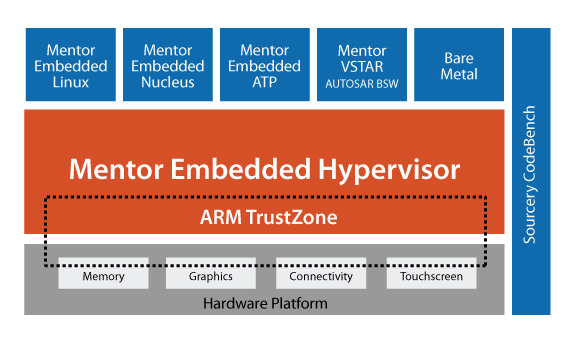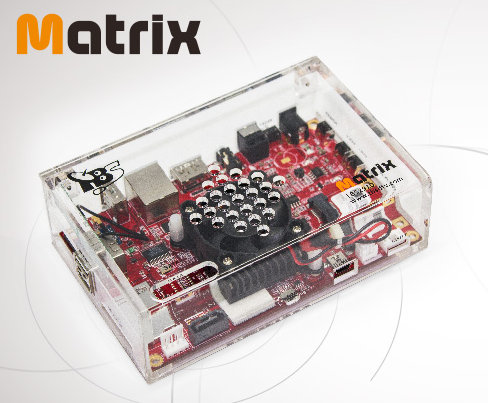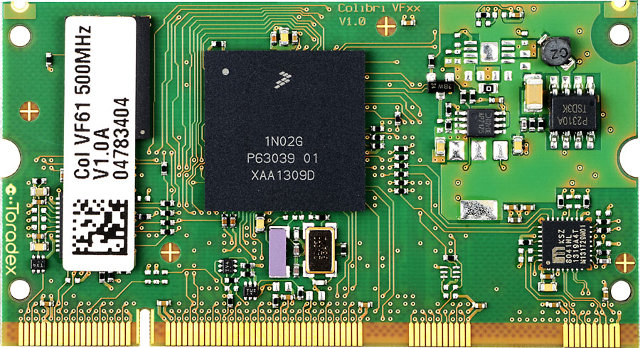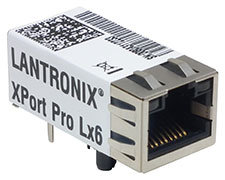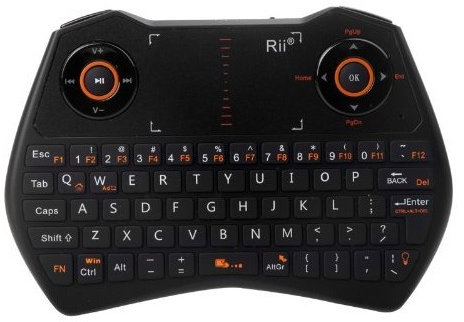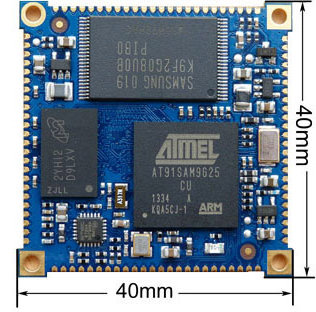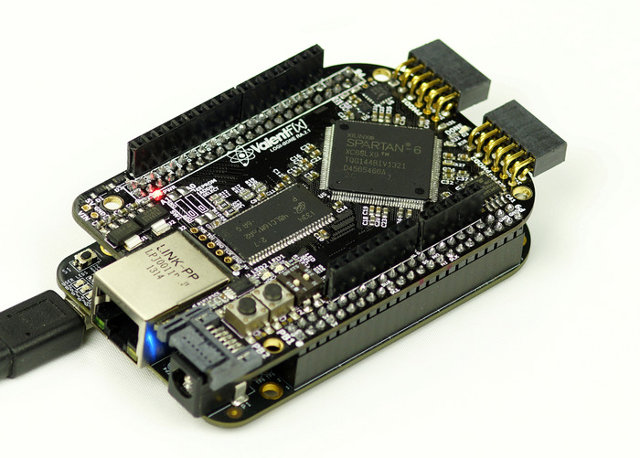Virtual machines are usually run on server or desktop PC to run several operating systems simultaneous. About 2 years ago, I wrote about an embedded hypervisor running Linux and Android on the Pandaboard develompent board, with the goal of separating home and enterprise operating systems in mobile devices so that enterprise data is safe. Since then, virtualization extensions are now part of ARM Cortex A15 / A7, and as well as the new Cortex A53 / A57 ARMv8 64-bit cores, but in my mind at least, those where mostly designed to address the server market. It turns out hypervisors are also useful in the automotive field, where for example, the dashboard and In-vehicle infotainment (IVI) systems runs in two separate virtual machines controlling two different displays from one processor. Mentor Embedded showcased such automotive system at ARM Techcon 2013, where they showed a Freescale i.MX6 quad core board, which looks […]
Fedora 20 “Heisenbug” Release Makes ARM a Primary Architecture
Fedora has been supporting ARM architecture for a while now, but it was only as a secondary architecture without official support. With the recent Fedora 20 release, nicknamed “Heisenbug”, the ARM architecture, more exactly ARMv7 hard float and greater, is promoted to a primary architecture meaning ARMv7 will have the same status as x86 and x86_64 architectures with packages officially build and supported by the Fedora community. What it does not mean however, due to the nature of ARM architecture, is that you can simply download an ISO to install on any ARM platforms, like you would do on an Intel or AMD computer. It’s a little more complicated than that, as it is platform specific, but instructions are available for the Beaglebone Black, Compulab Trimslice, the Wandboard, Calxeda Energycore Midway and Highbank, and Versatile Express in QEMU. You can download images with MATE, KDE, XFCE, LXDE, SOAS desktops, as […]
TBS Matrix ARM mini PC Features Freescale i.MX6Q, Supports USB DVB Tuners
TBS, a producer of digital TV tuners for PC, has decided to launch their own ARM mini PC called Matrix to interface with their USB DVB tuners. The board is based on Freescale i.MX6 Quad ARM Cortex A9 SoC with 2GB RAM, 16GB eMMC flash, and costs about $150. The company also claims to have XBMC, VDR, Tvheadend software running on the platform. Here are the specifications for this quad core ARM board / computer (Codename: TBS2910): SoC – Freescale i.MX6 Quad (MCIMX6Q5EYM10AC) quad core ARM Cortex A9 processor @ 1.0 GHz with Vivante GC2000 3D GPU System Memory – 2GB DDR Storage – 16GB eMMC, SD card slot, micro SD card slot, and SATA interface USB – 3x USB 2.0 host ports, 1x USB OTG Video Output – HDMI Audio Output – HDMI and 3.5mm audio jack Connectivity – 10/100/1000M Ethernet, and Wi-Fi 802.11n/b/g Expansion – 16-pin header for […]
Toradex Colibri VF50/VF61 SoMs Powered by Freescale Vybrid SoCs Sell for as Low as 19 Euros
Toradex Colibri VF50 and Colibri VF61 are system-on-modules respectively powered by Freescale Vyrbrid VF5xx Cortex A5 SoC and Vybrid VF6xx dual core Cortex A5/M4 SoC, which are part of the company’s Colibri ARM computer on modules. Toradex Colibri VF50/VF61 specifications: Processor VF50 – Freescale Vybrid VF5xx (MVF50NN151CMK40) ARM Cortex-A5 @ 400MH, 1.5MB SRAM VF61 – Freescale Vybrid VF6xx (MVF61NS151CMK50) ARM Cortex-A5 @ 500MHz, Cortex-M4 @ 167MHz, 1.0MB SRAM, and multiple hardware accelerated security features listed below. System Memory VF50 – 128MB DDR3 (16-bit, no ECC), or 64MB DDR3 with ECC (8-bit, ECC) VF61 – 256MB DDR3 (16-bit, no ECC), or 128MB DDR3 (8-bit, ECC) Storage VF50 – 128MB NAND flash VF61 – 1GB NAND flash Interfaces via the 200-pin SO-DIMM edge connector (X1): LCD RGB (24-bit), up to 1024 x 768 4-wire or 5-wire resistive touch Audio – I/O (VF61 only), SPDIF In and Out, I2S/AC97 compatibl Ehanced Serial Audio […]
Lantronix XPort Pro Lx6 is a Tiny Embedded Linux Server Fitted into an RJ45 Connector
Lantronix has recently launched XPort(R) Pro Lx6, a secure embedded device server supporting IPv6, that barely larger than an RJ45 connector. The device runs Linux or the company’s Evolution OS, and is destined to be used in wired industrial IoT / M2M applications. Lantronix XPort Pro Lx6 Specifications: Processor – Freescale ColdFire MCF5208 up to 166.67 MHz (TBC) 32-bit processor System memory – 16MB SDRAM Storage – 16MB Flash Serial Interface – Software selectable data rates from 300 to 921kbps Programmable IO – 3 PIO pins (software selectable) Network Interface – 10Base-T and 100Base-TX Link with support for IPv4 and IPv6, and the following protocols: TCP/IP, UDP/IP, ARP, ICMP, SNMPv2, TFTP, FTP, Telnet, DHCP, BOOTP, HTTP, SMTP, PPP, AutoIP, RSS, and SYSLOG Security – TCP/AES and UDP/AES Temperature Range – Operating and storage: -40° to +85° C Relative Humidity – 0% to 90% non-condensing Regulatory Approvals – FCC Part 15, Subpart […]
Rii Mini i28 Do-it-all RF Remote Can Be Used as a Backlit QWERTY Keyboard, a TouchPad, an Air Mouse, a Gamepad, and an Headset
There are many 2.4 GHz “magic” remote, often called Air mice, to use with Android devices, or computer mainly such as Mele F10, or Measy RC11. They usually comes with a qwerty keyboard, and a gyro that allow you to move the mouse pointer on the screen by moving the remote around, and are much more convenient that a standard IR remote with Android mini PCs. Newer models such as Mele F10 Pro often include a microphone, and a jack to connect an headphone, but Rii Mini i28 is going a few steps further, some may even say a few steps too far, as it features a backlit QWERTY keyboard, Air mouse function, a microphone and a headphone jack, as well as a touchpad, and some of controls that make it look like a gamepad (No analog though). Rii Mini i28 “thing” specifications: Keyboard – 70 Keys QWERTY keyboard with […]
$30 CoreWind Tech CORE9G25 SoM Features Atmel SAM9G25 (ARM9) Processor
CoreWind Tech CORE9G25 is a system-on-module based on Atmel SAM9G45 processor with 128 to 256 MB RAM, and 256 MB Flash available in commercial and industrial temperature range. If the picture below seems familiar, it’s because it’s a clone of ACME Systems’ ARIA G25, and the company went as far as more or less copying most of ACME Systems’ Aria page on their own domain. Here are CORE9G25 / Aria G25 specifications: CPU – Atmel AT91SAM9G25 (ARM9) @ 400Mhz CPU System Memory – 128MB or 256MB DDR2 RAM Connectivity – 10/100 Mbit Ethernet interface USB – Up to 3 USB 2.0 host ports (2 Hi-Speed, 1 Full-Speed) Interfaces: Up to 6 serial lines Up to 2x I2C buses Up to 2x SPI buses Up to 60 GPIO lines Up to 4x A/D lines @ 10 bit Dimensions – 40 x 40 mm Operating temperature range – 0 to 70 °C […]
$89 LOGi Development Boards Add FPGA and Arduino Headers to the Raspberry Pi and Beaglebone Black (Crowdfunding)
LOGi-Pi and LOGi-Bone are expansion boards featuring Xilinx Spartan 6 for respectively the Raspberry Pi, and the Beaglebone Black. Valent F(x), the company who designed the boards, is currently looking for funds via Kickstarter in order to bring the cost down to $89, or even $69 for early backers. LOGi boards specifications: FPGA – Xilinx Spartan 6 LX9 TQFP-144 FPGA 9,152 Logic Cells, 16 DSP48A1 Slices, 576KB Ram, and 96 User Available I/O Pins System Memory – 256 Mb SDRAM connected to the FPGA Storage – 1x High Bandwidth SATA connector expansion port Video Output – 10x Length-tuned LVDS Pairs Connectors: 2x Digilent Inc. PMOD ports supporting 59+ plug-and-play hardware modules Arduino compatible headers connected to the FPGA pins (3.3v only) supporting over 200 Arduino Shields. Bit-Stream loading interface connected to the host processor, optional bitstream FPGA self-loading from onboard Flash. Misc – 2x LEDs 2x Push Buttons 2x DIP Switches 3.3v I/O Regulator and […]


